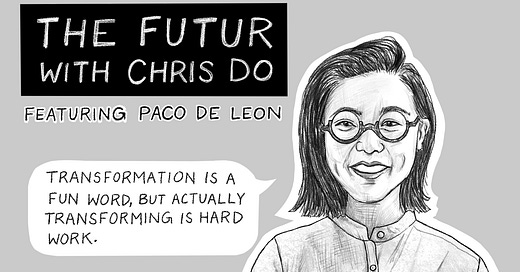Your view on money affects your ability to earn
Author and entrepreneur Paco de Leon on how to become aware of your money narrative—and change it for the better
“Transformation is a fun word, but actually transforming is hard work.”
–Paco de Leon
Quick Summary
Chris Do and Paco de Leon, an author and entrepreneur who runs a bookkeeping agency for creative professionals, talk about how engrained beliefs about money impact your career and finances.
You can catch the complete episode (1 hour) here.
Key Takeaways
Don’t trade your time for money. Instead of setting hourly rates, Paco encourages creative professionals to use value-based pricing. That involves determining the price of a product/service based on the value it provides to the customer. Chris agrees, but shares that he’s gotten a lot of pushback about this. He and Paco suspect that skepticism of value-based pricing comes from a reluctance to change one’s mindset about how much clients are willing to pay.
It’s easy for creative professionals to conflate their work with their identity. When you’re pricing or selling your work, you may internalize those numbers as a reflection of your own worth. Paco reminds listeners that what people are willing to pay is a reflection of market forces—not your value as a human being.
Your view on money affects your ability to earn. Your view is shaped by a combination of life circumstances, many of which are out of your control: your parents, peers, the environment you grew up in, as well as media. This money narrative inevitably shapes big decisions, like the career you pursue.
To uncover your money narrative, Paco recommends observing the things you say to yourself about money, as well as what the people around you say. What messages do you repeat or consistently hear? A few examples: “People like me don’t get rich.” “People like me can’t afford to do this thing.” “Investing is scary and difficult.”
Also, meditate. Understand that your beliefs about finances are malleable—and that you can change your money mindset. Speaking of money mindsets…
Lack mindset vs. abundance mindset. Humans are inherently aware of scarcity—we naturally pay attention to and become stressed when things run out. This biological instinct helped us survive the hunter-gather days, but in the modern era, it contributes to a lack mindset (also known as a scarcity mindset). This is the belief that resources and opportunities are limited. Afraid customers will run out, creative professionals with a lack mindset might underprice their products/services in hopes of being affordable for more clients.
An abundance mindset revolves around the belief that there’s enough for everyone. Creatives with this mentality tend to feel more confident about their contributions and have a higher ceiling for financial success.
Schedule weekly finance time. If you want to improve your relationship with money, Paco recommends setting aside a regular block of time for your finances. Start small—for example, by taking 20 minutes to gather all the logins for your financial accounts. Move on to bigger tasks over time, like looking at your credit card statements the next week. Acknowledging how emotionally charged money can be, Paco reminds listeners to “be gentle with yourself.” Getting comfortable with your finances won’t happen overnight.
Your mental/emotional state determines the quality of your decisions. For example, when you go grocery shopping while hungry, you tend to buy more food than you would otherwise. Because of this, you should schedule your weekly finance time when you’re in your “window of tolerance.”
From Dan Siegel, the window of tolerance is your best mental and emotional state for functioning in everyday life. Imagine rating your current state on a scale from 1 to 8, where 3-4 is your window of tolerance. Anything above means hyper-arousal—an excess of energy that might appear as anxiety, irritability, and general emotional chaos. Anything below is a sign of hypo-arousal, where you may feel numb, exhausted, even depressed, from a lack of energy.
Thoughts
My wonderful friend Aadil, the person who first introduced me to the idea of sketch noting, once told me, “ur allergic to charging money for ur talent.” This observation was all kinds of eye-opening because he nailed it: I’m terrible at pricing my work. (My train of thoughts: Am I asking for too much? Too little? Is this unreasonable?) I am so squeamish and uncomfortable with pricing that for most friends who have asked for a piece of art, I’ve insisted on creating for them free of charge. For one, I even tried a “pay what you want” deal. Paco nails it on the head when she says that it’s easy to conflate our work with who we are, and believe that “the prices that people pay is a direct reflection of who I am and my value and my worth.” I have long understood creative work to be a vulnerable endeavor, so I enjoyed this episode especially for exploring that idea and its very real impact on money.
If you made it this far, thank you for being here! The best way to support Sketch Pad is by sharing this visual with someone who might enjoy it. And if you’d like to, send me your podcast recommendations here.
–Joyce




